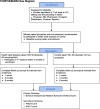Death Cafés for prevention of burnout in intensive care unit employees: study protocol for a randomized controlled trial (STOPTHEBURN)
- PMID: 33308290
- PMCID: PMC7729694
- DOI: 10.1186/s13063-020-04929-4
Death Cafés for prevention of burnout in intensive care unit employees: study protocol for a randomized controlled trial (STOPTHEBURN)
Abstract
Background: Burnout is an occupational syndrome that leads to mental health problems, job turnover, and patient safety events. Those caring for critically ill patients are especially susceptible due to high patient mortality, long hours, and regular encounters with trauma and ethical issues. Interventions to prevent burnout in this population are needed. Preliminary studies suggest debriefing sessions may reduce burnout. This study aims to assess whether participation in regular debriefing can prevent burnout in intensive care unit (ICU) clinicians.
Methods: A randomized controlled trial will be conducted in two large academic medical centers. Two hundred ICU clinicians will be recruited with target enrollment of 100 physicians and 100 non-physicians (nurses, pharmacists, therapists). Participants must have worked in the ICU for the equivalent of at least 1 full time work week in the preceding 4 weeks. Enrolled subjects will be randomized to virtually attend biweekly debriefing sessions facilitated by a psychotherapist for 3 months or to a control arm without sessions. Our debriefs are modeled after Death Cafés, which are informal discussions focusing on death, dying, loss, grief, and illness. These sessions allow for reflection on distressing events and offer community and collaboration among hospital employees outside of work. The primary outcome is clinician burnout as measured by the Maslach Burnout Inventory (MBI) Score. Secondary outcomes include depression and anxiety, as measured by the Patient Health Questionnaire 8 (PHQ-8) and Generalized Anxiety Disorder 7-item scale (GAD-7), respectively. Questionnaires will be administered prior to the intervention, at 1 month, at 3 months, and at 6 months after enrollment. These values will be compared between groups temporally. Qualitative feedback will also be collected and analyzed.
Discussion: With ICU clinician burnout rates exceeding 50%, Death Café debriefing sessions may prove to be an effective tool to avert this debilitating syndrome. With COVID-19 limiting social interactions and overloading ICUs worldwide, the virtual administration of the Death Café for ICU clinicians provides an innovative strategy to potentially mitigate burnout in this vulnerable population.
Trial registration: ClinicalTrials.gov NCT04347811 . Registered on 15 April 2020.
Keywords: Anxiety; Behavioral symptoms; Burnout; Critical care; Death Café; Depression; Healthcare workers; Moral distress; Occupational stress; Randomized controlled trial; Teledebriefing; Virtual debriefing; Work place retention.
Conflict of interest statement
The authors declare that they have no competing interests.
Figures
References
Publication types
MeSH terms
Associated data
Grants and funding
LinkOut - more resources
Full Text Sources
Medical
Miscellaneous



